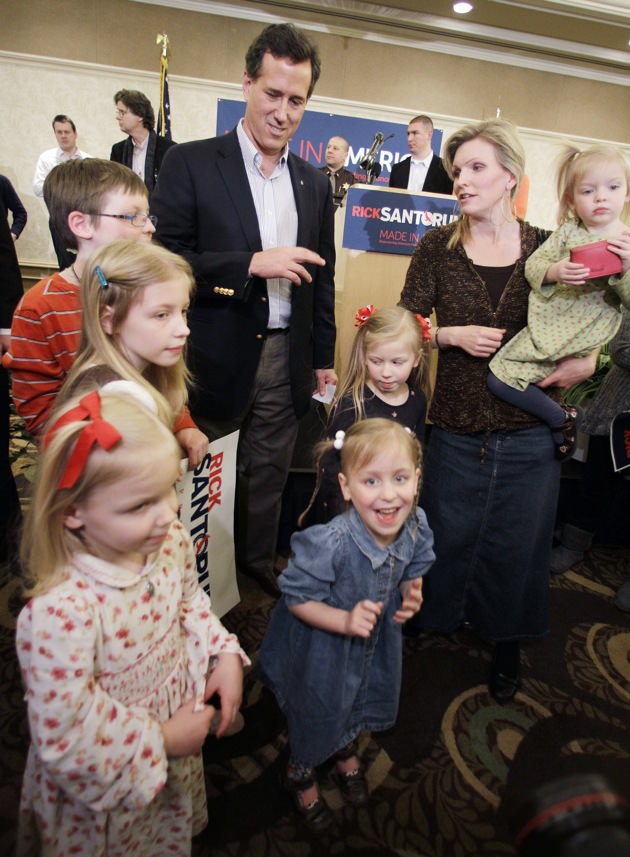Rick Santorum, who nearly defeated Mitt Romney in yesterday’s Michigan primary and remains close to him in national polls, says that President Obama wants to force colleges on everyone because “he wants to remake you in his image.” If that is the President’s goal, he has chosen a very inefficient means for achieving it. College administrators and faculty have intense internal divisions on what they are doing, or trying to do. If the President of the United States could make this unwieldy body of men and women all march to his orders, he would be accomplishing what no president of a college has ever achieved.
Santorum seems to be thinking of colleges as resembling his own teaching experience. As a home schooler of his seven children, he had a monopoly on what they were taught at impressionable ages. He is thinking of himself when he says an educator “wants to remake you in his image.” Why else did he make it impossible for other minds, of elders or even of equals, to impinge on the minds of his children? (Perhaps he does not think of this as “remaking” the children’s minds but of “making” them, since they did not have anything to remake until he made them. In this case he is comparing himself not with a college teacher but with God.)
Of course, the idea that colleges are stealing people’s children from their parents’ God is an old belief on the right wing. William Buckley proclaimed it in his God and Man at Yale, published over half a century ago, in the 1950s surge of religiosity that some conservatives now look back on with nostalgia. Of course, as Catholics, Buckley and Santorum (and I) are heirs to a long tradition of trying to control what people think or read or see. When I was young, the list of movies we were forbidden to see was posted every Sunday in the vestibule of our church. The priests who taught me in high school sent me and my fellows out to drug stores to demand that “dirty” magazines like Esquire be removed from their stands. There was still an Index of Forbidden Books we are supposed not to read—including works by Milton, Rousseau, Voltaire, Sartre, Gide—without a priest’s permission.
These bans would have been disgustingly repressive if they had not been so laughably ineffectual. We should have known, what we were not told, that many of the most brilliant atheists of the Enlightenment were trained in Jesuit schools. For that matter, the time in my life when I most doubted the existence of God was when I was in a Jesuit seminary during the religious 1950s. This would be, by Santorum’s logic, a reason for urging no one to enter a seminary. For that matter, while we are at it, why not abolish seminaries? Or abolish the Jesuits (though that was tried and failed)?
Santorum says that 62 percent of people who go to college lose their “faith commitment” there. (Odd, isn’t it, how even people who believe in the old values have to flop back on social-science talk—“faith commitment” for plain religion?) Some have questioned those statistics, which come from a 2007 report that found even greater decline among those who don’t attend college. I do not know how one measures such things, but I think it inevitable that questioning of childhood beliefs should take place at various stages of adolescence. This does not happen in junior year or senior year on campus. It is part of a long process called growing up.
At some point, late or early, children disengage themselves from the stories crafted for them. Their loss of belief in the tooth fairy is only slightly behind their loss of teeth. There is a slow motion race to disappear between Santa Claus and the Easter Bunny. The Stork undergoes, for some, a lengthier demise—and “the birds and the bees” do not long outlast it. Others, I hope, soon disabuse themselves of belief in their parents’ infallibility. Certain religious myths are discarded without necessarily losing faith. That I do not believe in Noah’s Ark does not mean that I must stop believing in God—though certain home schooling parents force that connection on their kids.
Minds grow by questioning things, and adolescence is a great period of questions. Mark Twain and H. L. Mencken learned to cross-examine the Bible all on their own, without any help at all from college. An unquestioned faith is not faith but rote recitation. The opposite of such questioning is not deep belief but arrested development.
So Santorum has mistaken his enemy. It is not colleges that steal his kids from him, but growth, especially the wrenching growths of adolescence. He should get at root causes. Abolish adolescence. I am sure modern science, with the help of hormonal retardants, could make this practicable in most cases. Of course, it would wipe out the human race. But perhaps a tested few, home schooled to insure arrested development in all other matters, could be permitted to grow up and breed. And we know they would breed prolifically, denied all contraceptives.
Advertisement



